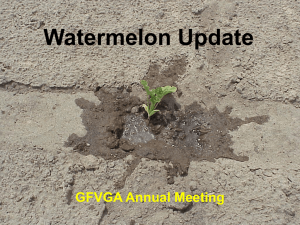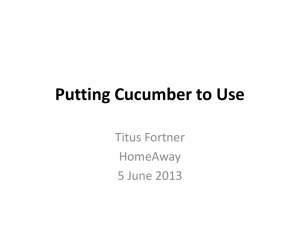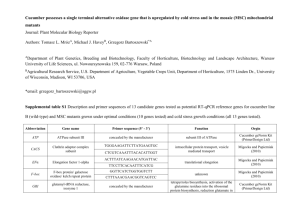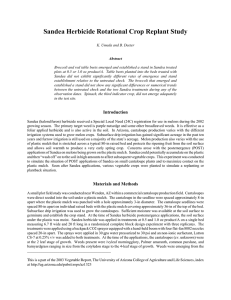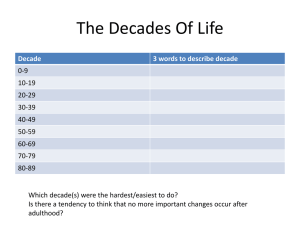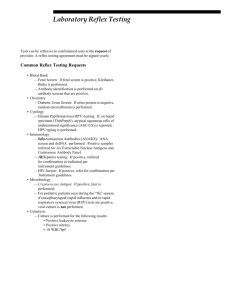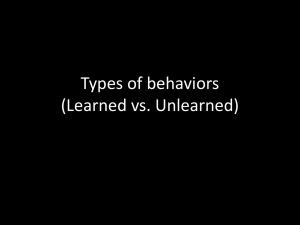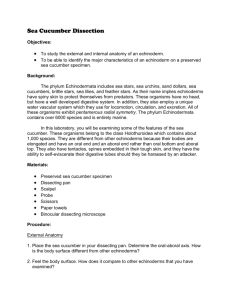WEED CONTROL IN PROCESSING CUCUMBERS
advertisement
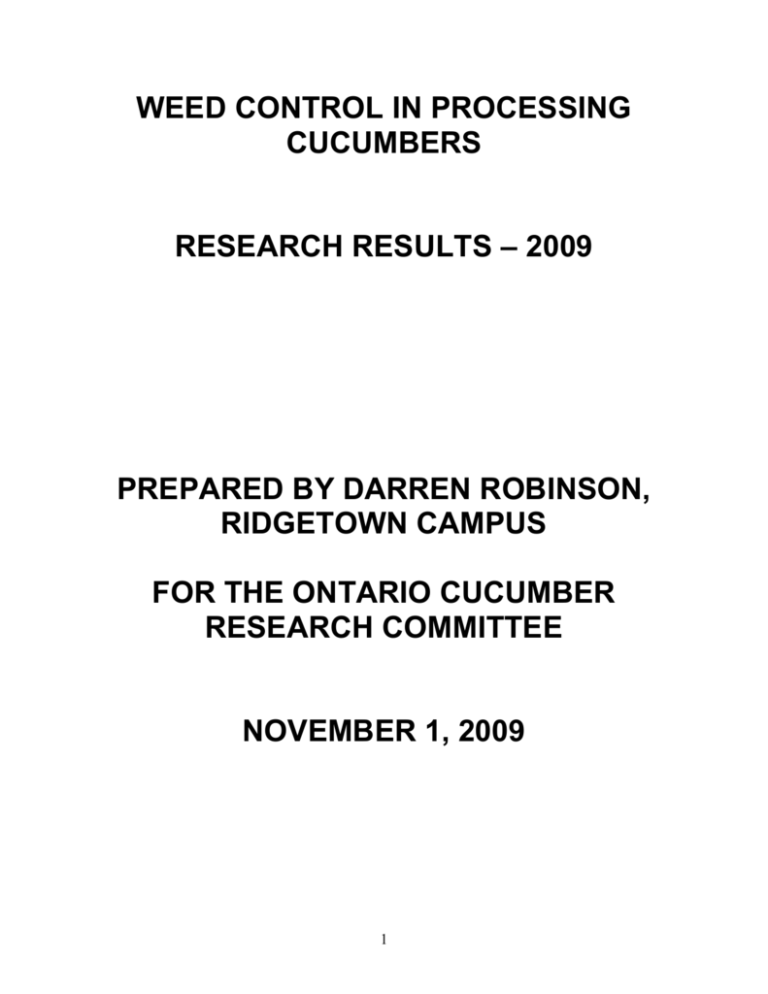
WEED CONTROL IN PROCESSING CUCUMBERS RESEARCH RESULTS – 2009 PREPARED BY DARREN ROBINSON, RIDGETOWN CAMPUS FOR THE ONTARIO CUCUMBER RESEARCH COMMITTEE NOVEMBER 1, 2009 1 ACKNOWLEDGEMENTS Purpose Of This Booklet This booklet is provided as a guide to the 2009 processing cucumber weed control research control plots. The experiments outlined in this booklet are located at Ridgetown Campus. We appreciate the funding, cooperation and assistance provided by the Ontario cucumber research committee (cucumber growers and processing companies). As well, we would like to thank the chemical companies and their representatives, agextension personnel, and other research scientists for their ideas, plant material and herbicide samples that were used in these trials. Funding for the 2009 research program was provided by: Ontario Cucumber Research Committee & Ontario Food Processors Association Agchemical Companies Technical Assistants Research Technician David Bilyea Research Assistants Laurie Devereaux Kyle Vink We trust that the information provided by this research will further the science of weed control by assisting with the registration of herbicides through the minor use system. We also hope this information will be of use in the extension of proper herbicide recommendations, thereby enabling growers to achieve consistent, broad spectrum weed control with a minimum of crop damage. D.E. Robinson Ridgetown Campus, University of Guelph Ridgetown, Ontario N0P 2C0 (519) 674-1604 drobinso@ridgetownc.uogelph.ca 2 TRIAL 1: WEED MANAGEMENT IN CUCUMBERS Objective: Determine the tolerance of cucumber to preemergence applications of Dual II Magnum, Command, Sandea, and Outlook. Materials & Methods: Crop: Cucumber Variety: Lafayette Planting rate: 265684 seeds/ha Row spacing: 75cm Planting date: May 22 Depth: 2 cm Design: Randomized Complete Block Design Plot width: 2m Plot length: 10m Reps: 4 Field Preparation: Trial fertilized with 27-0-0 at 250 kg/ha and 18-19-19 at 300 kg/ha on May 21/09. Soil Description: Sand: 78% Silt:14% Clay: 8% Application Information: APPLICATION DATE TIME OF DAY TIMING AIR TEMP (c) RH (%) WIND SPEED (KPH) SOIL TEMP (c) CLOUD COVER (%) CROP STAGE OM: 4.4% pH: 5.9 CEC 12 Texture: v. fine sandy loam Soil: Watford/Brady Series A MAY 23 10:00 AM PRE 20 45 1 20 0 PRE Spray Equipment: Application Method: CO2 Backpack Nozzle Type: Air Induction Nozzle Spacing: 50 cm (20”) Spray Volume: 200 L/ha (20 GAL/AC) Pressure: 207 KPA (30 PSI) Nozzle Size: ULD120-02 Boom Width: 1.5 m (60”) 3 Table 1.1. Effect of herbicide treatment on cucumber visual injury 7, 14 and 28 days after application, and cucumber yield. HERBICIDE RATE 1. Check (WEEDFREE) 7D 0A VISUAL INJURY 14D 0B 28D 0A 2. COMMAND 0.63L/AC 0A 0B 0A 3. COMMAND 1.26 L/AC 0A 0B 0A 4. SANDEA 25 G/AC 0A 0B 0A 5. SANDEA 50 G/AC 0A 0B 0A 6. REFLEX 0.4 L/AC 0A 0B 0A 7. REFLEX 0.8 L/AC 0A 5A 0A 8. COMMAND + 0.63 L/AC 0A 0B 0A 0A 0B 0A 0 2 0 SANDEA 9. COMMAND + REFLEX 25 G/AC 450 ML/AC 0.4 L/AC LSD (P <0.05) Table 1.2. Effect of herbicide treatment on yield (graded – No 1 to No 4). HERBICIDE RATE No1 YIELD (T/AC) No2 No3 No4 1. Check (WEEDFREE) 3.8B 3.0AB 22.6A 10.1A 2. COMMAND 0.63L/AC 3.4B 2.4B 32.7A 13.4A 3. COMMAND 1.26 L/AC 4.7AB 4.1AB 30.3A 11.9A 4. SANDEA 25 G/AC 4.3AB 2.8AB 19.9A 11.2A 5. SANDEA 50 G/AC 3.5B 3.2AB 30.1A 14.4A 6. REFLEX 0.4 L/AC 3.7AB 3.4AB 33.2A 14.0A 7. REFLEX 0.8 L/AC 4.8AB 3.9AB 21.9A 9.0A 8. COMMAND + 0.63 L/AC 5.9A 4.7A 28.1A 9.7A 4.6A 3.1AB 23.0A 11.2A SANDEA 9. COMMAND + 25 G/AC 450 ML/AC REFLEX 0.4 L/AC LSD (P <0.05) 2.0 1.7 14.1 7.8 Note: Means followed by the same letter are not significantly different (P=0.05, LSD). 4 Conclusions: This trial was kept weed-free to test for the effect of preemergence applications of Command, Sandea and Reflex on visual injury, stand and yields of cucumber. Visual injury was observed in the high rate of Reflex, but the cucumber outgrew the injury by 28 days after emergence. Yield by grade and total yield were not less than the untreated check in any of the herbicide treatments. Data will be submitted to the PMRA to support the current URMULE for Command in vine crops. As well, Gowan has indicated that it will be looking to register Sandea in vine crops – our data will be used to support the URMULE submission. The Reflex data will be used to help support a joint URMULE-IR4 submission. 5
